Apple iPhone 16e vs Samsung Galaxy A56: Great starting points
We may earn a commission if you make a purchase from the links on this page.
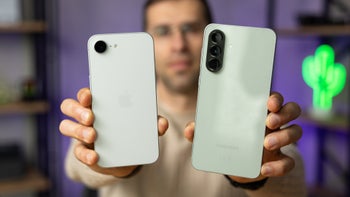
Intro
Can an Android midrange phone compete with the latest affordable iPhone? This is another million-dollar question that we'll try to answer today, and we have the perfect contenders to pit against each other.
In the blue corner we have the freshly launched Samsung Galaxy A56—the top contender in the midrange weight category, if we're to stick to the boxing analogies. The phone comes with a lot of bells and whistles—a great Super AMOLED 120 Hz screen, flexible cameras, a hefty battery, and Samsung's Awesome Intelligence. And all this for just $499.
In the red corner, ready to spring, we have the iPhone 16e, the newest addition to the affordable iPhone range and a spiritual successor to the SE line. This tiny $599 phone comes with top silicon on board, alongside the core iPhone experience, but it also brought some sacrifices.
Which one will emerge victorious? Let's find out!
In the blue corner we have the freshly launched Samsung Galaxy A56—the top contender in the midrange weight category, if we're to stick to the boxing analogies. The phone comes with a lot of bells and whistles—a great Super AMOLED 120 Hz screen, flexible cameras, a hefty battery, and Samsung's Awesome Intelligence. And all this for just $499.
Which one will emerge victorious? Let's find out!
iPhone 16e vs Galaxy A56 differences explained:
| iPhone 16e | Galaxy A56 |
|---|---|
| Smaller and lighter device | A more compact phone |
| A smaller 6.1-inch screen with less impressive 60Hz refresh rate | Larger 6.7-inch Super AMOLED display 120Hz |
| Just a single 48MP main camera | A triple camera setup, main camera is 64MP, 12MP ultrawide, 5MP macro |
| Less memory in the base version (6GB) | More memory in the base version (8GB) |
| Equal native storage (128GB) | 128GB of storage in here as well |
| A smaller 4,005mAh battery | Larger 5,000mAh battery that will potentially deliver better battery life |
| Slow wired charging, but wireless charging | No wireless charging, but faster wired charging |
| Starts at $599 for the 128GB version | Less expensive at $499 for the same 128GB storage option |
Table of Contents:
Design and Display Quality
Stuck in the 60Hz past
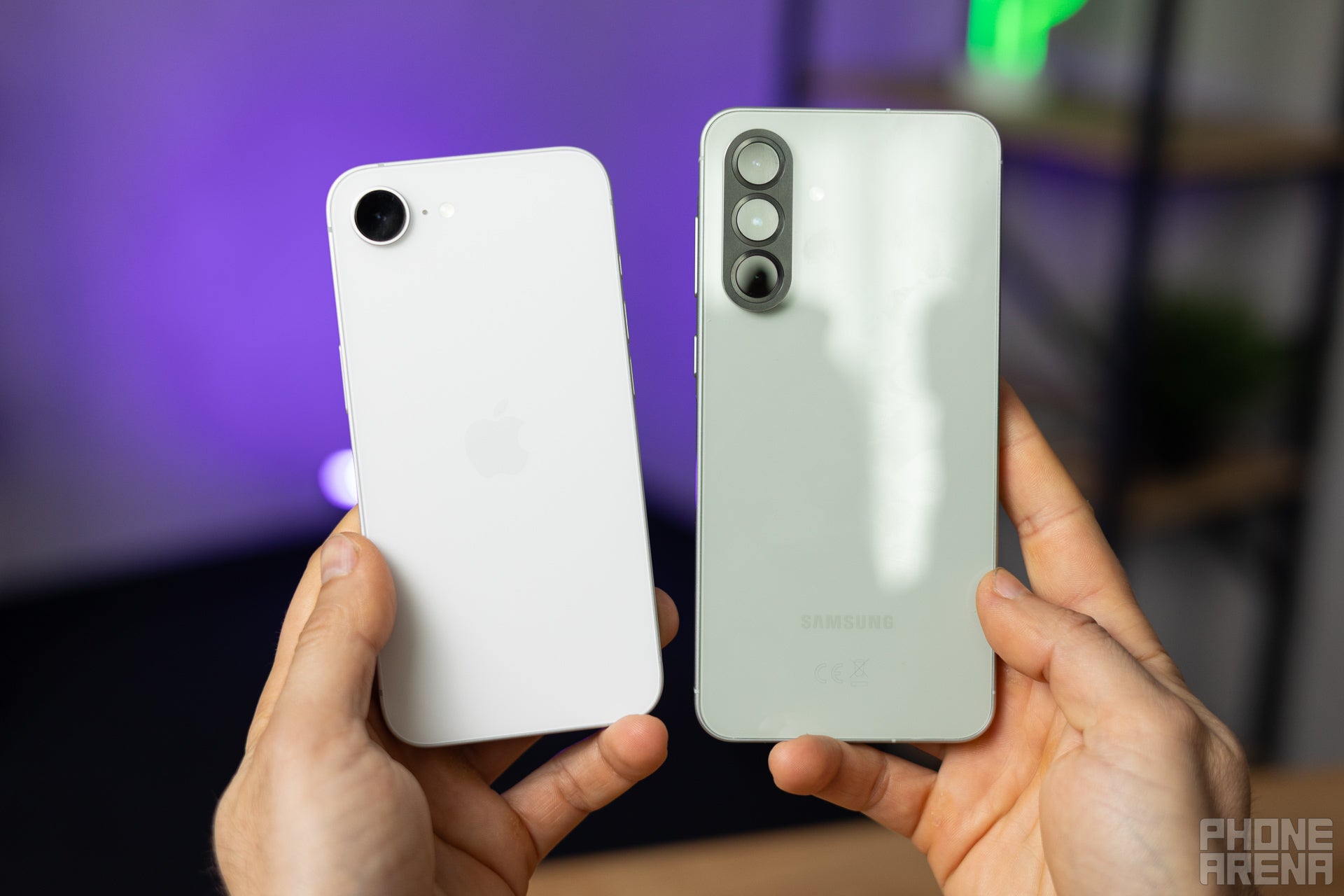
There's a substantial difference in size and weight between these two, due to the different screen sizes. The iPhone 16e is more compact, measuring 146.7 x 71.5 x 7.8 mm, and also lighter, coming in at 167 grams. In comparison, the Galaxy A56 measures 162.2 x 77.5 x 7.4 mm and weighs 198 grams.
In terms of materials, both phones make use of the old glass-and-metal sandwich recipe; there are no exotic materials involved, but it's good to see Gorilla Glass on the back of a $499 phone. In the hand, the iPhone 16e feels better, but that's to be expected given the smaller footprint and the lighter weight.
In terms of materials, both phones make use of the old glass-and-metal sandwich recipe; there are no exotic materials involved, but it's good to see Gorilla Glass on the back of a $499 phone. In the hand, the iPhone 16e feels better, but that's to be expected given the smaller footprint and the lighter weight.
iPhone 16e dimensions and weight:
- 146.7 x 71.5 x 7.8 mm, 167 grams
Galaxy A56 dimensions and weight:
- 162.2 x 77.5 x 7.4 mm, 198 grams
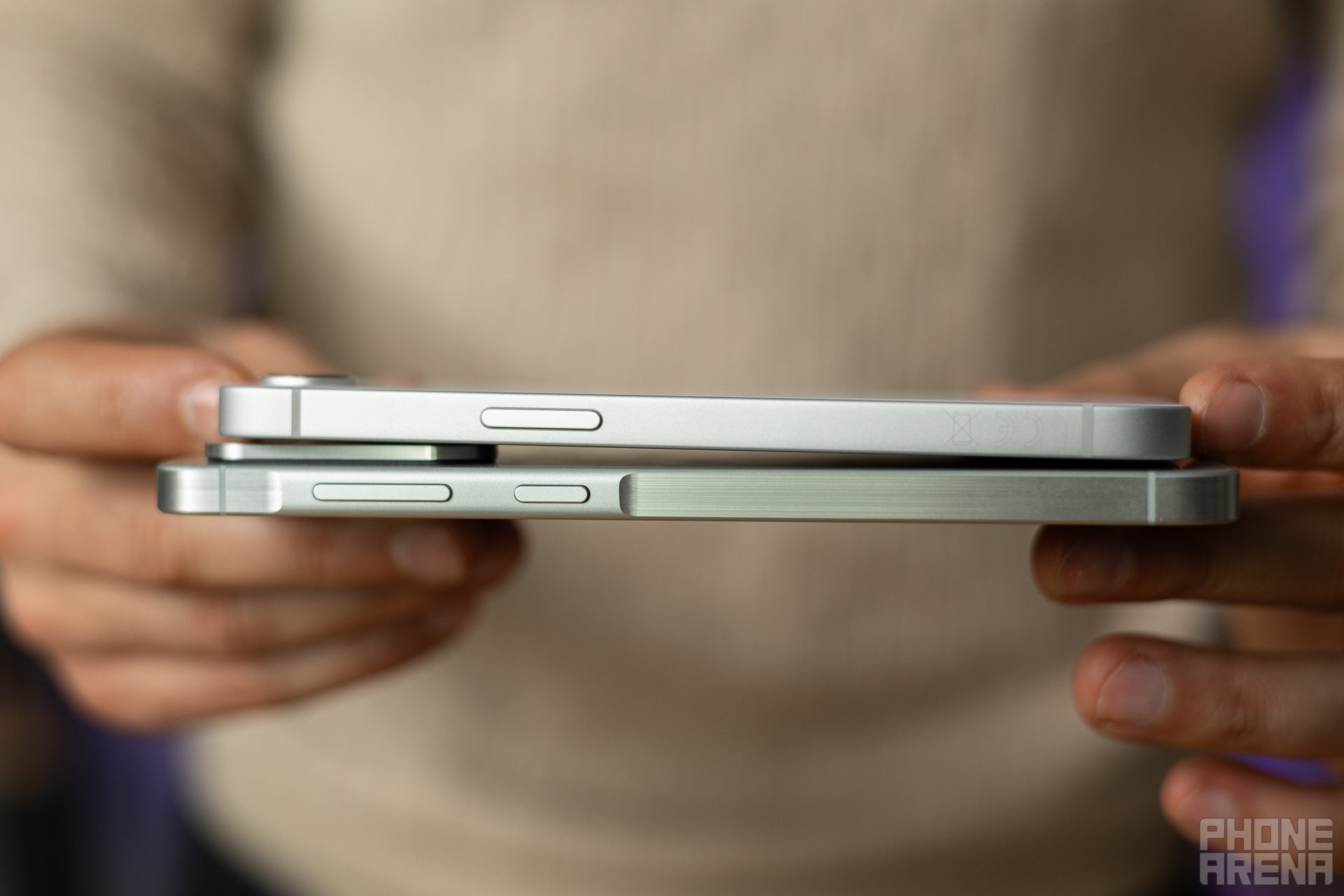
In terms of thickness, the Galaxy A56 is slightly thinner at 7.4 mm, and this difference feels exaggerated by the bigger overall dimensions of the phone—it feels even thinner. The iPhone 16e, on the other hand, comes with a tad better water resistance.
It's rated IP68, which Apple translates as immersible up to 6m for 30 min, while the Galaxy A56 comes with an IP67 rating, meaning you can safely dip the phone in fresh water up to 1 meter for 30 minutes.
Finally, here are the available colors.
iPhone 16e available colors:
- White
- Black
Galaxy A56 available colors:
- Pink
- Olive
- Graphite
- Lightgray
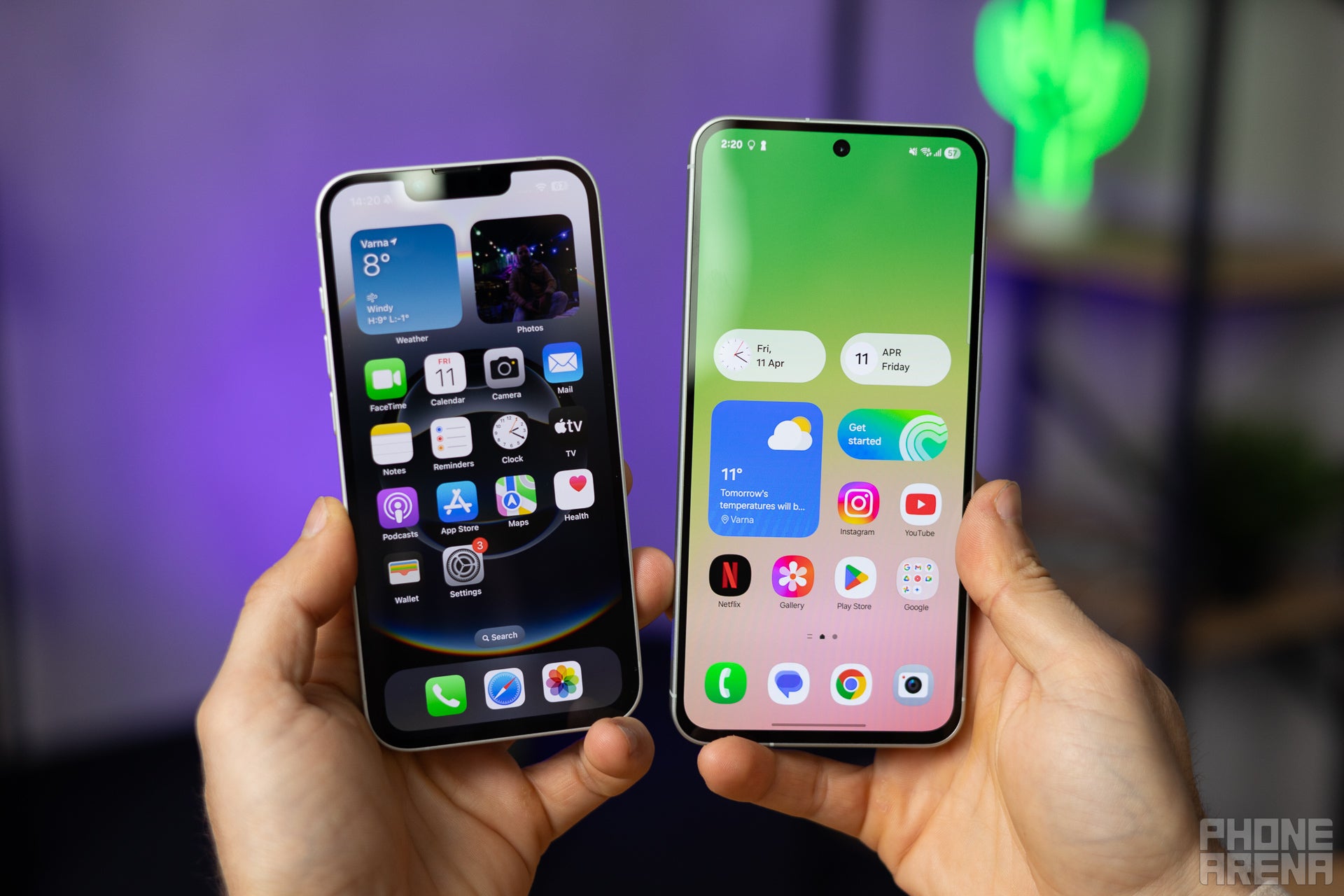
Moving to the display part of the equation, we find a remnant from the past—the iPhone 16e still uses a 60 Hz refresh rate for its display. We understand that Apple had to do this in order not to undermine its more expensive flagships (which still use the same choppy 60Hz refresh rate), but it's 2025, and you can get 90Hz phones for $299.
The iPhone 16e comes with a Super Retina XDR OLED display measuring 6.1 inches diagonally and sporting a resolution of 1170 x 2532 pixels, resulting in around 457 PPI pixel density. Apple cites 800 nits in high brightness mode and 1200 nits peak, which is on the lower side in 2025.
The Galaxy A56 features a 6.7-inch Super AMOLED screen with a 120 Hz refresh rate and a resolution of 1080 x 2340 pixels, which translates to around 385 PPI pixel density. According to Samsung, the phone can do 1200 nits in high brightness mode and 1900 nits peak. Let's check out all these claims.
We have a clear winner when it comes to brightness. The Galaxy A56 managed an impressive result of 1,700 nits at 20% APL, outscoring the iPhone 16e massively. The minimum brightness is also in favor of the A56, but the iPhone 16e is slightly better with color reproduction right off the bat.
Performance and Software
No competition for the A18
The iPhone 16e comes with a slightly tweaked version of the A18 chipset, featuring a 4-core GPU module. The phone also features 8GB of RAM, and you can get it in several storage configurations, starting at 128GB and going all the way up to 512GB.
Samsung also slapped its own silicon inside the Galaxy A56, but it's of the Exynos variety and much more modest. It's the Exynos 1580, coupled with 6GB of RAM. Time for some benchmarks.
Samsung also slapped its own silicon inside the Galaxy A56, but it's of the Exynos variety and much more modest. It's the Exynos 1580, coupled with 6GB of RAM. Time for some benchmarks.
Unsurprisingly, the iPhone 16e obliterates the Galaxy A56 when it comes to raw power, both in CPU single-core, CPU multi-core, and graphics performance. In all fairness, both phones work smoothly in normal day-to-day activities. There's no perceivable lag or stutter on the A56, and because of that 120Hz screen, sometimes things even look smoother than on the iPhone.
Camera
SUBHEADING

The iPhone 16e comes with just one single wide-lens camera on its back. This is a rarity in 2025, when even budget phones come equipped with two or even three cameras on their backs. It's a decent camera, though, with a 48 MP sensor under an f/1.6 lens and also featuring OIS and Dual PD autofocus.
The Galaxy A56 has an advantage in pure camera count, as it comes with three snappers on its back. We have one main 50MP, f/1.8 camera also sporting OIS and PD autofocus, but then we also have a 12MP ultrawide and a 5MP macro camera.
PhoneArena Camera Score:
Looking at the camera score, it's plain to see where the difference comes from. Even though the Galaxy A56 manages to score higher, it's purely down to having a dedicated ultrawide camera. The main camera score goes to the iPhone 16e. So, the takeaway here is - if you need an ultrawide camera, the Galaxy A56 might be the better choice. If you're okay with only one camera, the one found on the iPhone 16e is better.
Camera Samples
The samples confirm what our camera score showed earlier. The iPhone manages to pull out a tad more details, the dynamic range is slightly wider, and photos look slightly sharper. That said, the Galaxy A56 comes a close second; the difference is not huge. In low light conditions, the iPhone manages to keep the exposure at bay and again produce sharper and slightly more detailed photos.
Battery Life and Charging
5000 for the win
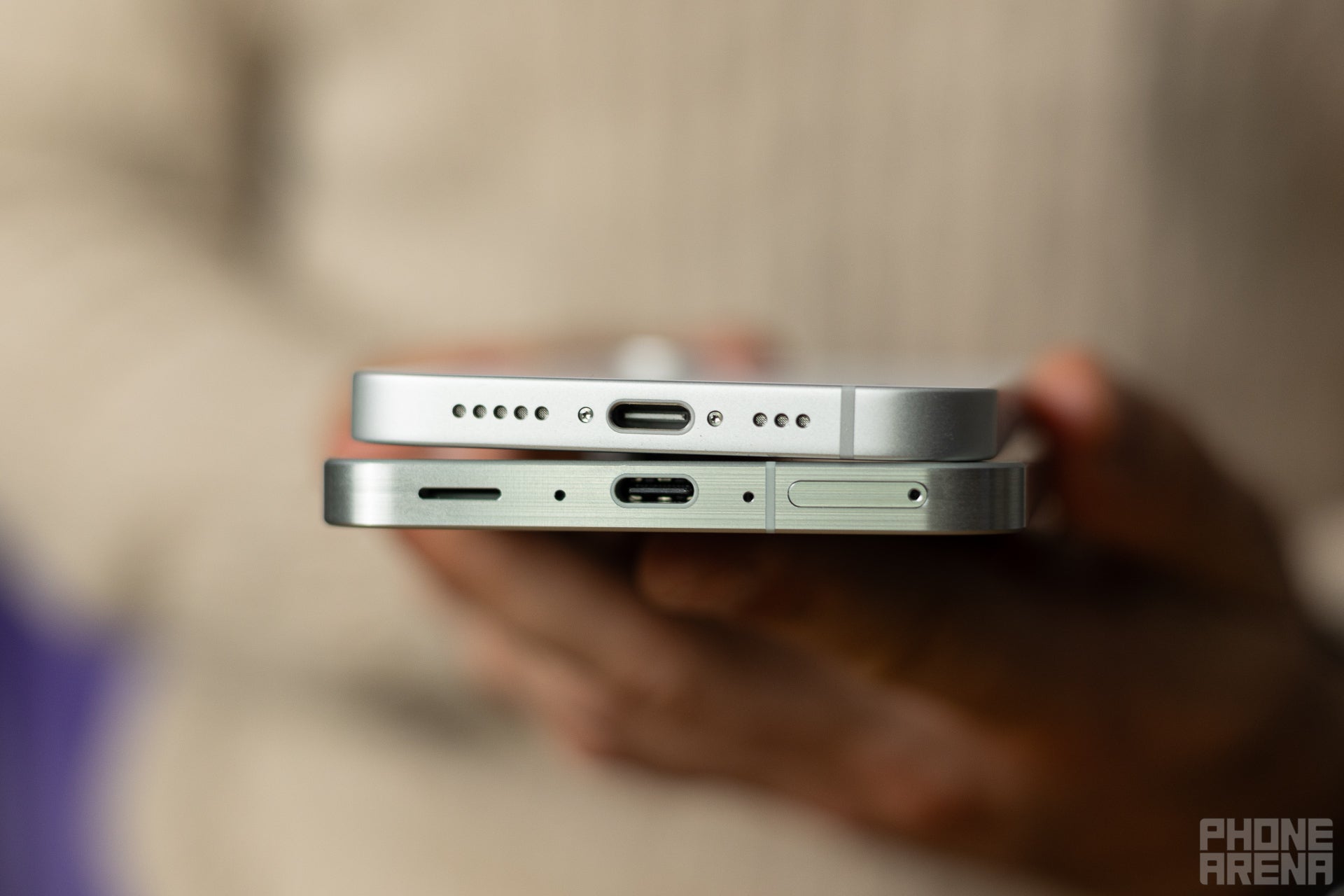
Apple managed to crunch in a reasonably large battery (by Apple standards), and also considering the size of the iPhone 16e, 4,005 mAh is not bad at all. Still, the Galaxy A56 has a 1000 mAh advantage, which, coupled with the midrange chipset, should be enough to win the battery battle for Samsung.
PhoneArena Battery and Charging Test Results:
And indeed, the results are in favor of the Galaxy A56. Both phones scored almost identical times in our browsing test, but the Galaxy A56 took the lead in YouTube streaming and gaming.
The fast wired charging on the Galaxy A56 was able to fill up the 5,000 mAh battery from zero to 100% in 1 hour and 14 minutes, substantially faster than what the iPhone 16e was able to achieve. Then again, the iPhone 16e comes with wireless charging, albeit not MagSafe but the slower Qi variant.
The fast wired charging on the Galaxy A56 was able to fill up the 5,000 mAh battery from zero to 100% in 1 hour and 14 minutes, substantially faster than what the iPhone 16e was able to achieve. Then again, the iPhone 16e comes with wireless charging, albeit not MagSafe but the slower Qi variant.
Specs Comparison
Here's a quick specs comparison, for a more detailed one, head to our dedicated iPhone 16e versus Galaxy A56 comparison page on PhoneArena.
| iPhone 16e | Galaxy A56 |
|---|---|
| Size and Weight 146.7 x 71.5 x 7.8 mm 167 g | Size and Weight 152.4 x 72.9 x 9 mm 193 g |
| Display 6.1-inch OLED 60Hz | Display 6.1-inch OLED 90Hz |
| Processor Apple A18 (3nm) | Processor Exynos 1380 (5nm) |
| Versions 8/128GB for $599 | Versions 6/128GB for $499 |
| Cameras 48MP main, f/1.6 12MP front | Cameras 50MP main, f/1.8 12MP ultra-wide, f/2.2 5MP macro 12MP front |
| Battery 4,005 mAh | Battery 5,000 mAh |
| Charging 50% in 30 min 7.5W Qi wireless | Charging 45W wired No wireless |
Which one should you buy?
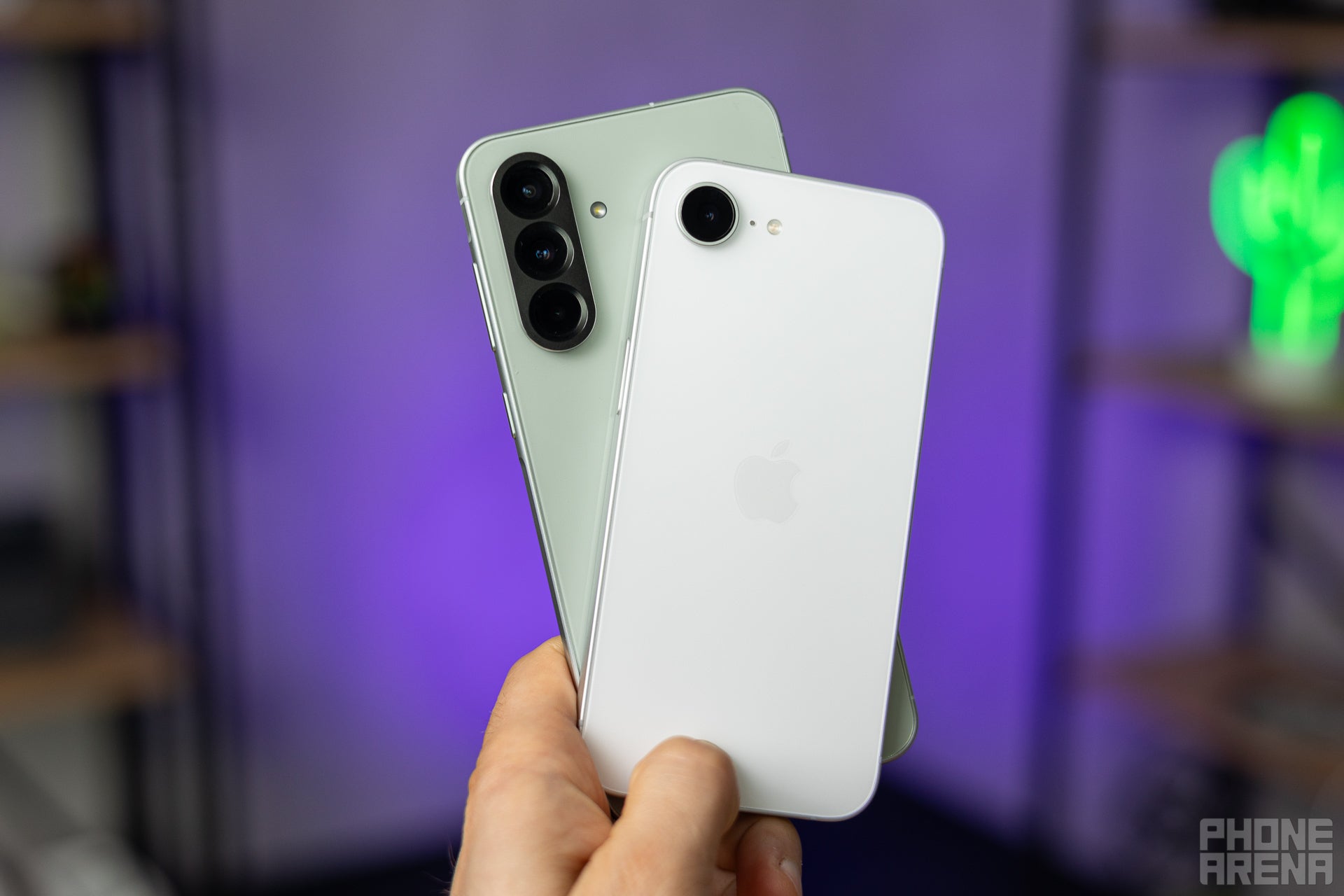
This one is harder than it looks like on the surface. On the one hand, we have a quite complete package in the face of the Samsung Galaxy A56. It comes with a great 120 Hz, 6.7-inch display that's also very bright. There are three cameras on the back, and even though one is just a macro snapper with limited usefulness, it's still a more flexible system than the one on the iPhone 16e.
The battery and charging situation is also in favor of the Galaxy A56, as is the price—the Samsung mid-ranger is $100 cheaper. On the other hand, we have the compact iPhone 16e, which offers the core iPhone experience for just $599. Granted, it only comes with one camera, but if you use the main camera most of the time anyway, this shouldn't be such a downside. The raw power is there, and so is Apple Intelligence.
And just like always, it all boils down to ecosystem allegiance. If you're already invested in Apple's ecosystem, the iPhone 16e is the better choice. The same goes for the Galaxy A56. If you're looking to start fresh and want to try dipping your toes in the respected Samsung and Apple rivers, both phones will get you there and are great options.
The battery and charging situation is also in favor of the Galaxy A56, as is the price—the Samsung mid-ranger is $100 cheaper. On the other hand, we have the compact iPhone 16e, which offers the core iPhone experience for just $599. Granted, it only comes with one camera, but if you use the main camera most of the time anyway, this shouldn't be such a downside. The raw power is there, and so is Apple Intelligence.
And just like always, it all boils down to ecosystem allegiance. If you're already invested in Apple's ecosystem, the iPhone 16e is the better choice. The same goes for the Galaxy A56. If you're looking to start fresh and want to try dipping your toes in the respected Samsung and Apple rivers, both phones will get you there and are great options.
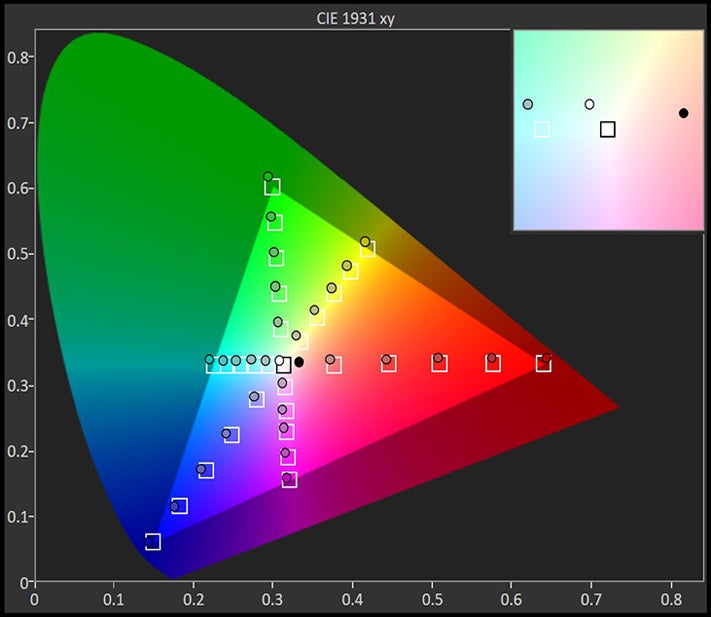












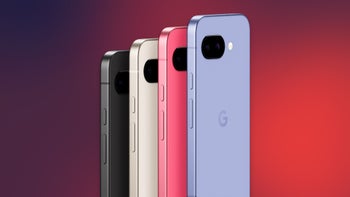
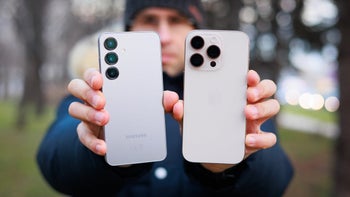
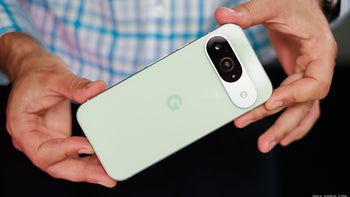
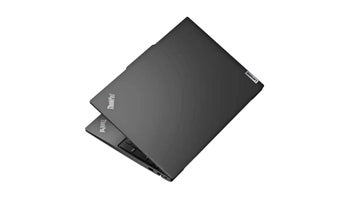
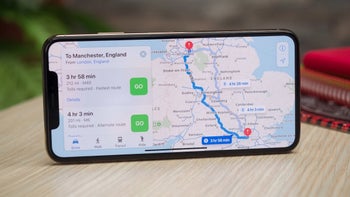







Things that are NOT allowed: